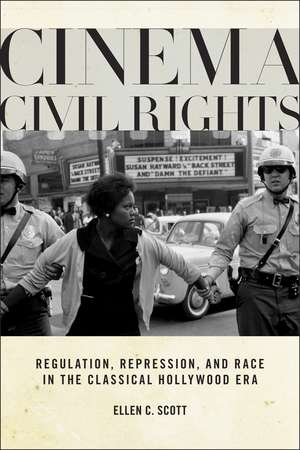Cinema Civil Rights: Regulation, Repression, and Race in the Classical Hollywood Era
Autor Ellen C. Scotten Limba Engleză Paperback – 14 ian 2015
From Al Jolson in blackface to Song of the South, there is a long history of racism in Hollywood film. Yet as early as the 1930s, movie studios carefully vetted their releases, removing racially offensive language like the “N-word.” This censorship did not stem from purely humanitarian concerns, but rather from worries about boycotts from civil rights groups and loss of revenue from African American filmgoers.
Cinema Civil Rights presents the untold history of how Black audiences, activists, and lobbyists influenced the representation of race in Hollywood in the decades before the 1960s civil rights era. Employing a nuanced analysis of power, Ellen C. Scott reveals how these representations were shaped by a complex set of negotiations between various individuals and organizations. Rather than simply recounting the perspective of film studios, she calls our attention to a variety of other influential institutions, from protest groups to state censorship boards.
Scott demonstrates not only how civil rights debates helped shaped the movies, but also how the movies themselves provided a vital public forum for addressing taboo subjects like interracial sexuality, segregation, and lynching. Emotionally gripping, theoretically sophisticated, and meticulously researched, Cinema Civil Rights presents us with an in-depth look at the film industry’s role in both articulating and censoring the national conversation on race.
Preț: 231.05 lei
Preț vechi: 268.88 lei
-14% Nou
Puncte Express: 347
Preț estimativ în valută:
44.22€ • 48.01$ • 37.14£
44.22€ • 48.01$ • 37.14£
Carte indisponibilă temporar
Doresc să fiu notificat când acest titlu va fi disponibil:
Se trimite...
Preluare comenzi: 021 569.72.76
Specificații
ISBN-13: 9780813571355
ISBN-10: 0813571359
Pagini: 268
Ilustrații: 30 photographs
Dimensiuni: 152 x 229 x 18 mm
Greutate: 0.44 kg
Ediția:None
Editura: Rutgers University Press
Colecția Rutgers University Press
ISBN-10: 0813571359
Pagini: 268
Ilustrații: 30 photographs
Dimensiuni: 152 x 229 x 18 mm
Greutate: 0.44 kg
Ediția:None
Editura: Rutgers University Press
Colecția Rutgers University Press
Notă biografică
ELLEN C. SCOTT is an assistant professor of media studies at Queens College–City University of New York.
Cuprins
Acknowledgments
Introduction
1. Regulating Race, Structuring Absence: Industry Self-Censorship and African American Representability
2. State Censorship and the Color Line
3. Racial Trauma, Civil Rights, and the Brutal Imagination of Darryl F. Zanuck
4. Shadowboxing: Black Interpretive Activism in the Classical Hollywood Era
Conclusion
Notes
Index
Introduction
1. Regulating Race, Structuring Absence: Industry Self-Censorship and African American Representability
2. State Censorship and the Color Line
3. Racial Trauma, Civil Rights, and the Brutal Imagination of Darryl F. Zanuck
4. Shadowboxing: Black Interpretive Activism in the Classical Hollywood Era
Conclusion
Notes
Index
Recenzii
"An original and insightful contribution to the scholarly literature on the history of Hollywood representations of African Americans."
"The contribution that Scott makes to African American film history with Cinema Civil Rights is sizeable, but it is her sense of purpose rather than her exhaustive research that makes the book essential."
"This well-written, meticulously researched, and forcefully argued study explores the repression of civil rights on the American screen and the struggle of African American activists to find civil rights among the cinematic images that ignored 'the Black need for freedom.'"
"Ellen C. Scott has written an authoritative, compelling, wide-ranging and always illuminating history of the institutionally-based politics of racial representation in the classical studio era. A truly essential volume."
"Ellen C. Scott's deeply researched study of film censorship and Black film protests reveals that deep anxieties, rather than stereotypical certainties, structure representations of Blackness in classical Hollywood cinema."
Descriere
Cinema Civil Rights presents the untold history of how black audiences, activists, and lobbyists influenced the depiction of race in American films of the 1930s, 1940s, and 1950s. Drawing from extensive archival research, Ellen C. Scott takes us to the sites, both inside and outside of Hollywood, where these representations were shaped. She thus offers a nuanced examination of the film industry’s role in both articulating and censoring the national conversation on race.
